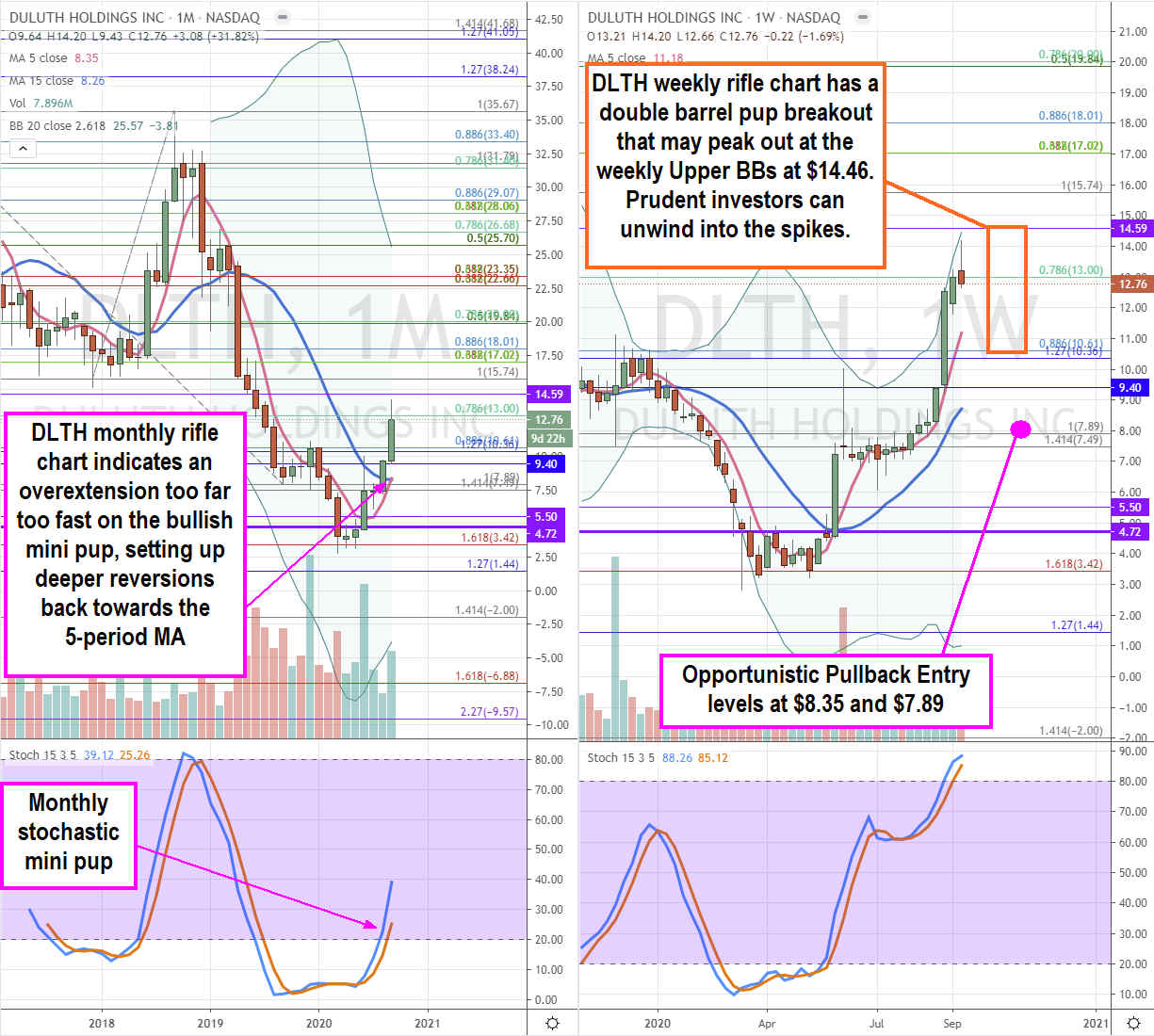Shares of casual wear manufacturer
Duluth Holdings NASDAQ: DLTH have rallied sharply with the
S&P 500 index NYSEARCA: SPY as the stay-at-home lockdowns pumped up demand for casual, comfort and outdoor wear. Duluth turned out to be a surprise retail winner during the pandemic and share prices reflect the laggard discovery by the markets. As economic restarts accelerate, consumer demand likely shifts back over to
more luxury and
business-centric apparel in anticipation of an increase in social engagements. Shares may have gotten ahead of themselves as money exits momentum stocks and rotate into value. Prudent investors may consider using this rotation to wind down shares at opportunistic exit levels during this value buying rotation.
Q2 FY 2020 Earnings Release
On Sept. 3, 2020, Duluth released its second-quarter fiscal 2020 results for the quarter ending Aug. 2, 2020. The Company reported an earnings-per-share (EPS)profit of $.18 excluding non-recurring items versus consensus analyst estimates for a profit of $0.05, beating estimates by $0.13. Revenues grew 12.6% year-over-year (YoY) to $137.4 million versus $119 million consensus analyst estimates. Direct-to-consumer (DTC) sales grew 66.8% while retail store sales fell (-40.4%) due to closure from COVID-19. The Company attributes the shift to digital market for the 130% new buyer growth in the DTC channel. Women’s comfort apparel sales rose 10% YoY. When stores were closed, the Company moved aggressively shrink inventory through aggressive promotions, which decreased gross margin overall for Q2 by (-30 bps). The effects of COVID-19 peaked out in Q1 as Q2 represents the recovery. The Company slashed it capex in half to $15 million in response to the pandemic decreasing the number of new store openings to four for fiscal 2020. As of the earnings release, the Company has re-opened all 62 stores. Duluth ended the quarter with $19 million cash with an inventory balance of $167.6 million and approximately $79.5 million in credit revolvers.
Customer Migration to Digital Sales
The shift to digital sales was remarkable with an 80% YoY growth as, “customers shifted buying in-store to buying online” according to CFO Dave Loretta. He went on to state, “From the time that all stores were reopened, we’ve seen direct business in those store markets absorb entirely the shortfall and lower store traffic.” Customer traffic grew 34% YoY to 15 million site visits. However, site visits were down (-16%) sequentially from Q1 2020.
The Problem with Ecommerce Fulfillment
The downside of the surge in online shopping is the impact on residential “last mile” networks, which the Company anticipates will result in longer delivery times and higher shipping costs. The primary shipping provider UPS NYSE: UPS has already announced “steep peak charges and extremely tight daily allocations that are below our forecasted needs.” Duluth is already anticipating potential delivery bottlenecks during the holiday season and is actively working to find alternatives to satisfy the potential 60% YoY increase in demand. With so much eCommerce activity expected moving forward, companies will be forced to absorb or pass along the rising shipping costs. The customer experience will also be hampered for those who experience extended delivery times and instances of lost packages. The hybrid model of ordering online and picking up at the store or returning online orders back to the store is an advantage that brick and mortar retailers have over pureplay eCommerce players like n with game distributors Amazon NASDAQ: AMZN. The Company expects delivery bottlenecks to add an extra 100 to 200 bps in costs. Duluth has demonstrated impressive execution, but shares have gotten ahead of themselves and could provide reentry opportunities on deeper reversions. Meanwhile, prudent investors may want to consider unwinding at opportunistic exit levels.

DLTH Opportunistic Exit Levels
Using the rifle charts on the monthly and weekly time frames provides a broader view of the landscape for DLTH stock. The monthly rifle chart has a stochastic mini pup which triggered a market structure low (MSL) buy above $4.72. The monthly 5-period moving average (MA) support is rising at $8.35. The weekly rifle chart has a double barrel pup breakout composed of a moving average pup breakout combined with the stochastic mini pup. The upside target hovers just shy of the $14.59 Fibonacci (fib) level. Prudent investors may consider using the elevated price spikes to unwind positions at opportunistic exit levels at the $14.59 fib, $13.00 fib and $10.61 fib as a potential stop-loss. The Company performance was exceptional so deeper pullbacks can also set-up opportunistic pullback entries at the $8.35 monthly 5-period MA and $7.89 fib.
Before you consider Duluth, you'll want to hear this.
MarketBeat keeps track of Wall Street's top-rated and best performing research analysts and the stocks they recommend to their clients on a daily basis. MarketBeat has identified the five stocks that top analysts are quietly whispering to their clients to buy now before the broader market catches on... and Duluth wasn't on the list.
While Duluth currently has a Hold rating among analysts, top-rated analysts believe these five stocks are better buys.
View The Five Stocks Here
Looking for the next FAANG stock before everyone has heard about it? Enter your email address to see which stocks MarketBeat analysts think might become the next trillion dollar tech company.
Get This Free Report
Like this article? Share it with a colleague.
Link copied to clipboard.